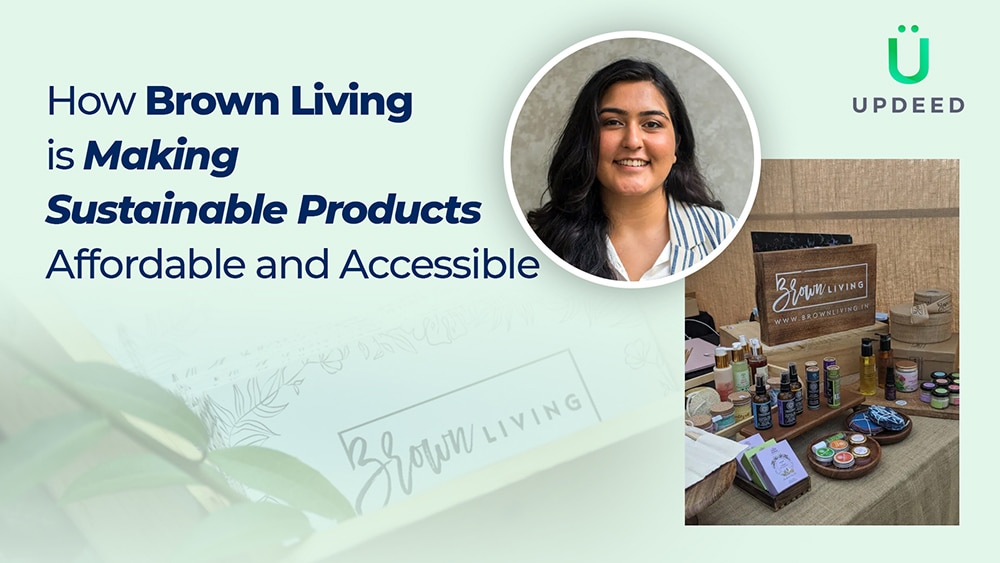How Brown Living is Making Sustainable Products Affordable and Accessible
Living a sustainable lifestyle requires significant changes in daily habits, routines, and mindset. It involves conscious choices prioritising the environment, such as reducing waste, using less energy, and choosing sustainable products. However, finding the right kind of sustainable products is difficult.
Consumers have to face the dual challenge of limited options available in the market, and the higher price tag, making it difficult for individuals to invest upfront.

Leading to the birth of an idea
Realising such difficulties, Chaitsi Ahuja came up with an online marketplace widely known as Brown Living.
Founded in 2019, this Mumbai-based marketplace offers a wide range of everyday products (clothes, home decor, candles, skincare products, toys, etc.) for a sustainable, vegan, chemical-free and zero-waste lifestyle.
“I have worked in many corporates, and over time realised that when companies consider profit as a growth metric, it changes how the impact is made. Sustainability no more remains a priority,” said Ahuja, Founder and CEO, Brown Living.
Ahuja came across multiple NGOs to work as a consultant but realised that a lot of them had many common problems, like getting access to a specific market or being able to reach a specific set of consumers who have like a similar intent.
Ahuja’s idea was to create one platform where corporates and NGOs, working across domains, could come together, generate revenue, tell their stories, interact with consumers, and build a unique community.
“The basic idea that sustainable living is not just limited to only carrying a tote bag or carrying a water bottle, but it can be implemented in many ways of your life,” she added.
Here to organise and digitise
Ahuja outlines that the eco-friendly market in India has existed for over 20-25 years, but nobody sat down to organise and digitise that market.
“Our key impact metric is to support climate-positive entrepreneurs and to reach as many of them as possible. Similar to what Paytm did for payments, we are here to change people’s consumption habits,” said Ahuja.
To realise this ambition, it is important to have awareness among the masses of what is actually “sustainable” and what can be done. This calls for a lot of education in terms of giving consumers the tools (say, products, for example) to make the right choice and making that available on the landscape.
“You can start with simple objects in daily life and switch over to them like, from plastic pens to pens made with recycled paper, or like toothbrushes, shampoo bars not packaged in plastic bottles, and more. So these are just tools helping to stay mindful, stay closer to the cause, and move towards a sustainable lifestyle,” Ahuja said.
“We have seen a positive trend, especially from Gen Z and millennials, moving towards adopting a sustainable lifestyle. They, in turn, influence their parents. So, our goal is to reach a large segment of the Indian mass, mostly the middle class to upper middle class of India,” she added.
Challenges and the way forward
The marketplace handpicks each product from ethical brands only after evaluating its environmental impact across India. Additionally, they offer a product range that is free of plastic, promoting a shopping experience that is chemical-free, carbon-neutral, and free of plastic. They have removed plastic containers, Styrofoam, plastic tape, and bubble wrap from their shipping process.
However, it has a cost attached to it.
“Getting access to capital for the firm and listed sellers on our platform is difficult. The eco-friendly spaces are again not a priority for the investors; hence they only invest in a certain segment that can make good profits,” said Ahuja.
She added that it’s possible to bring down the cost of sustainable products in relation to the products currently available in the market. Say, for example, a plastic toothbrush costs around 30-40 rupees and bamboo toothbrushes today cost 200 rupees because it is not accessible in nearby stores.
This points towards the accessibility and affordability issues associated with sustainable products.
“With the online marketplace, we’re trying to bring many players to join, sell their products, and compete, ultimately resulting in lower costs. Further, we are trying to open as many doors as possible in terms of doing tie-ups with retail stores and convenience stores to strengthen the supply chain market and make it accessible to the general public,” said Ahuja.
“We are planning to go ahead and scale up tremendously in the next three to four years. Also, we have taken an ambitious goal of planting a million trees with profits that we make,” concluded Ahuja.
Ready to make a positive impact in the world?
UPDEED is the place for you. Our free and open platform is filled with inspiring stories from individuals and organizations who are making a difference in their communities and beyond. Connect and collaborate with like-minded individuals from around the globe on UPDEED, and discover your own potential to create meaningful change. Join our community and make a difference.





